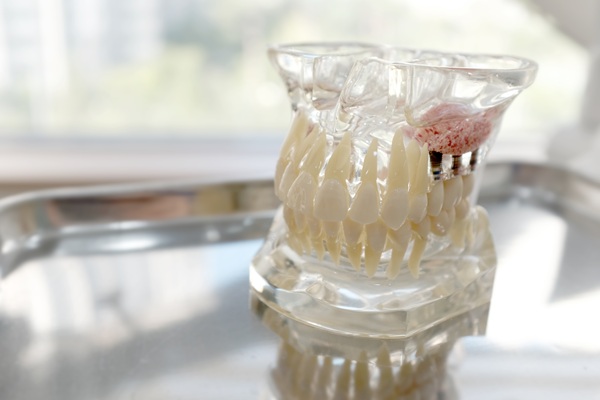Dental Implant FAQ: What Is a Bone Graft?

If you are supposed to get dental implant restoration, the dentist might recommend a bone graft as a necessary procedure. This procedure is often recommended for patients who may not have enough jawbone to support the implant. This article covers details you need to know about a bone graft.
Bone grafts for dental implants
If a person has lost their teeth due to injury, periodontal disease, or infection, dental implants are an efficient and long-term solution to consider. The dental implant goes inside the jaw to support the prosthetic teeth. If the patient lacks an adequate amount of healthy natural bone tissue, a bone graft procedure will be required. Deficiency of the jawbone may be caused by gum disease, a prolonged delay before replacing lost teeth, facial injury or trauma, and developmental defects.
For the implant restoration to be successful, the implant post must be fully stable inside the bone so that it can support the tooth affixed to it properly. The dentist will examine the patient’s jaw to ensure there is enough bone volume.
The bone graft procedure repairs and regenerates missing bone and restores correct facial contour through the transplant of bone tissues. The grafting process provides a sturdier base for the dental implant. A patient might still need a bone graft even if they only just had their teeth removed. The hole left by the lost tooth may not be the size of the restoration.
How bone grafts are performed
Different types of bone grafts are available, depending on the extent of the damage and the position of the lost teeth. Usually, the process entails removing bone material from another part of the body and transplanting it to the jawbone. The alternative would be to source the bone from cadaver or animal sources. After the bone graft, it may take a few months for the transplanted bone to regenerate new bone to support the insertion of the dental implant.
After the bone graft procedure
Bone grafts are performed on an outpatient basis and patients are usually sedated during the procedure. The patient should not feel much pain, but discomfort such as bruising, minor bleeding, and gum or skin irritation may occur afterward. These side effects are temporary.
Patients can use pain relievers and antibiotics to help the pain and reduce the risk of infections. The time it takes for the graft to fuse with the natural bone varies, depending on the patient. The dentist will provide dietary instructions, such as sticking to a diet of soft foods during healing to avoid stressing the gums and bone.
Do you need a bone graft for dental implants?
Inadequate jawbone density and quality can disqualify a patient from getting dental implants. An experienced dentist can recommend a bone graft procedure to augment the volume of the bone so it can support implants. Although this treatment will extend the treatment period duration, the result is usually worth the wait: a healthy and appealing set of teeth.
Request an appointment here: https://chico.drelloway.com or call Randal S Elloway DDS, Inc. at (530) 877-4994 for an appointment in our Chico office.
Check out what others are saying about our dental services on Yelp: Will I Need a Bone Graft for Dental Implants in Chico, CA.
Related Posts
IV sedation is one of the more common types of sleep dentistry. If you are nervous about IV sedation or are considering asking your dentist about it, then learning the basics is a good first step. This review offers a definition of IV sedation for sleep dentistry, when it is recommended and what the risks…
Do you need your wisdom teeth removed? Read on to learn about this common oral surgery procedure. The third set of molars, otherwise called the wisdom teeth, usually develop between 17 and 25 and are removed through oral surgery by a general dentist. Most individuals have at least one impacted wisdom tooth, which means it…
Sleep apnea is a common sleep disorder among overweight or obese people. A person with this condition often wakes up with a terrible headache and daytime tiredness. This results from pauses in breathing while sleeping and inadequate sleep. If you want to know how losing weight can help with your sleep apnea, here are explanations…
Regular visits to a general dentist are vital in maintaining healthy teeth and gums. General dentists are often primary care providers for dental health. They are specially trained to provide a wide range of services daily to prevent, diagnose, and treat oral health issues. This ensures their patients have healthy, functional, and beautiful smiles. The…

